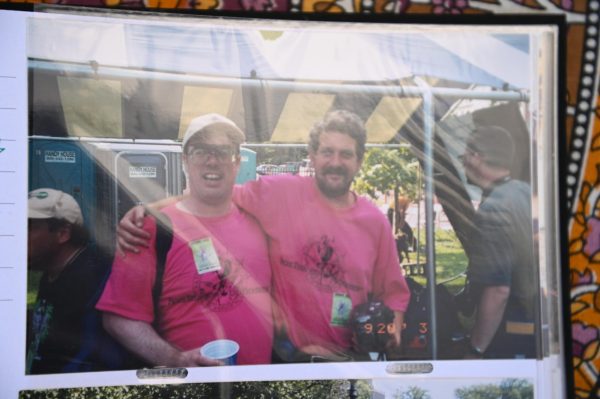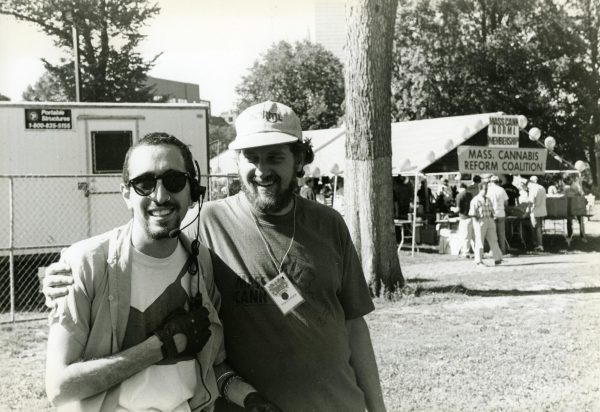Ellen Moore gazed at the mainstage of the 2025 Boston Freedom Rally as the band Roots of Creation took the stage through the haze dominating Boston Common. Though she enjoyed the music, there was something undeniably missing from this year’s festivities‚Äîor rather, someone.¬Ý
To the average rally goer, the 36th MASSCANN Freedom Rally was a success. Attendees enjoyed two days of sun while they shopped, smoked weed, and enjoyed musical acts around the Common. MASSCANN, the cannabis advocacy organization that has held the festival in the Common since 1992, promised the city it would address past pollution concerns, letting the festival last two days, a first since 2016.
But this year‚Äôs festivities carried a somber note. Bill Downing, a longtime Massachusetts cannabis advocate, was absent for the first time since the festival‚Äôs beginning in 1989. Downing died at 67 in his Reading, Mass. home on June 21.¬Ý
When Downing passed, the cannabis community mourned not only the loss of a leader but also of a friend, mentor, healer, and inspiration. Friends, family, and activists all recall a man who combined humor and humility with relentless dedication. Downing, who served as MassCann’s president for 14 years, was a familiar presence at rallies.
Many attendees, however, enjoy the fruits of Downing’s lifelong activism without knowing his story.

On Saturday, at 3:45 pm, friends and family gathered at the mainstage to give speeches and share anecdotes about their longtime friend. Ellen Moore, Downing’s partner of 4 years, was at a memorial tent in his honor, where memories and memorial shirts were draped across tables. She was grateful for the tribute which she said“really spoke to the power of Bill.”
For his son, Willy Downing, growing up with a cannabis advocate as a father meant experiencing two different, yet overlapping, worlds. For most of his childhood, Willy was oblivious to his father’s career up until his midteens. He said he enjoyed hearing the tributes, which opened him up to previously unknown parts of his father’s life.
‚ÄúHe was the same guy in both [worlds], but it‚Äôs interesting and surreal to hear about him from this totally different perspective,‚Äù Willy said.¬Ý
Like many teenagers, Willy experimented with cannabis, though never with his father. Looking back, he sees his father‚Äôs work not as something that ended with legalization but as part of a larger, ongoing struggle.¬Ý
‚ÄúI think he still thought there was a lot of work to do,‚Äù Willy said¬Ý
The Fight for Cannabis reform started long before Bill. Massachusetts was the first state to criminalize cannabis in 1911. This was reinforced again by both the Marihuana Tax Act of 1937 and the Controlled Substances Act of 1970, and was cemented again in 1973 with the Drug Enforcement Agency’s founding. This continued federal prohibition makes much of legal markets operations significantly more complex.
Downing‚Äôs commitment to the cause also stretched back decades. His roommate at Babson College, Paul Baker, recalled meeting him in 1977 as a freshman. Baker said that Downing was not only one of the founding members of MassCann, but helped make the Freedom Rally a huge event.¬Ý
Baker told The Beacon that¬Ý prior to Downing‚Äôs involvement, the Freedom Rally was a smaller affair, and that thanks to Downing‚Äôs media savviness, the festival grew rapidly. At festivals, Downing became infamous for¬Ý wearing a pig‚Äôs nose and following around suspected undercover cops during rallies.¬Ý
“He had a great sense of humor, [he was] a tireless advocate more than anything,” Baker said.

Encounters with early Massachusetts reformers like Steven Epstein and physician Dr. Lester Grinspoon furthered Downing‚Äôs activism in the late 1980s. Cannabis was both illegal on the federal and state levels despite changing tides. Arrests and criminal penalties continued. A grower of cannabis himself, Downing was struck by how, despite its ability to relieve suffering,¬Ý it remained criminalized.¬Ý
In the 1990s, public opinions and attitudes around cannabis began to change. Despite efforts, legal reforms continued to stall, and cancer patients who grew their own for medical use often found themselves on the wrong side of the law.¬Ý
Debates raged on the plant’s potential benefits at the national level into the 2000s, but Massachusetts did not pass significant reform until the 21st-century. In 2008, voters chose to decriminalize possession under one ounce, limiting it to a civil offense of $100. Four years later, in 2012, medical legislation followed; however, it was limited with only the most severe cases being given access or allowed to home grow at that time. And yet, raids of patient homes still persisted.
For Dr. Uma Dhanabalan, a Cambridge-based family physician and global cannabis educator, Downing was both a mentor and friend. They met in 2014 at the Northeastern Institute of Cannabis, where Downing ¬Ýtaught. Dhanabalan credits him for inspiring her advocacy.
‚ÄúI wouldn‚Äôt be such a bold global educator if it wasn‚Äôt for Bill,‚Äù she said. ‚ÄúHe empowered me to educate, embrace, and empower others.‚Äù¬Ý
When Downing’s foot was to be amputated due to gout, he collaborated with Dhanabalan in creating a cannabis based topical which led to other remedies. She said that this was a catalyst of his activism in medical cannabis.
‚ÄúWhat got Bill involved was his understanding of cannabis as medicine for his gout,‚Äù¬Ý she said.¬Ý
At the same time, Dhanabalan started one of the first patient caregiver support groups in Massachusetts, to which Downing heavily contributed. Though devoted to advocacy, Downing always prioritized the needs of cannabis patients.¬Ý
‚ÄúHis hands would always be in the dirt, his nails dirty, because he was constantly working,‚Äù Dhanabalan said.¬Ý¬Ý
‚ÄúWhat really drove him over the years was seeing how cannabis helped people medically, improving their lives,‚Äù Moore explained. That belief carried him through setbacks, including a 2015 raid of his CBD store in Allston. Though the raid didn‚Äôt result in charges, it weighed heavily on Downing. Despite this, he never abandoned patients; instead, he doubled down as a caregiver and educator. His monthly newsletters circulated the latest research on cannabinoids long before it entered the mainstream.¬Ý
“He always cared about the patient,” Moore said. “That was the heart of his work.”
Longtime cannabis activist John Dvo≈ô√°k, another mentee, said Downing was a force of nature.
‚ÄúHe saw the prohibition of marijuana as a vast evil, and dedicated his life to fighting that prohibition,‚Äù Dvo≈ô√°k said, describing his friend as being mischievous and willing to push boundaries for his dreams.¬Ý¬Ý
Eventually, the efforts of Downing and his friends at MASSCANN seemed to pay off when Massachusetts voters approved the legalization of recreational cannabis in a special ballot measure on Nov. 8, 2016. However, the measure was not the one presented by MASSCAN, but rather by the growing cannabis industry. The ballot measure allowed limited possession and home cultivation, and retail sales were still delayed.¬Ý
The Cannabis Control Commission (CCC) was created and took over the oversight of the industry from the Massachusetts Health Department. Eventually, the state’s first dispensary was opened in November 2018, coinciding with the Federal Farm Bill, which legalized hemp nationwide.
For Dvo≈ô√°k, however, the lesson to take from Downing is clear: There is more to be done. Dvo≈ô√°k said that today, improvements are needed in¬Ý patient access, consumption lounges, and combating the bureaucratic red tape surrounding cannabis use. Currently, resistance to expanding cannabis access remains with two petitions up for consideration this year,which would aim to repeal recreational use and homegrowing while preserving medical; one also sets THC caps.
‚ÄúJust because you can smoke legally does not mean the fight is over. Freedom is not free,‚Äù Dvo≈ô√°k said.¬Ý
Though Downing spent countless hours in court battles, regulatory hearings, and rallies, friends and family say Downing‚Äôs humor was never absent.¬Ý¬Ý
Moore recounted a time when, in his sixties, Downing was denied entry to a dispensary in Northampton for not having proper ID.¬Ý
“Do you know who you just asked to leave the store?” Moore laughed, recalling the scene. To her, the irony of a 67-year-old activist who fought for legalization being carded like a clean-shaven freshman captured both the absurdity and the progress of the movement Downing helped build.
He remained active in shaping regulations and continued to fight for medical patients‚Äô rights until his death. Moore remembered supporting him in the latter part of his years-long legal battle with the city of Boston to ensure the survival of the Freedom Rally and tax exemptions for cannabis medical patients.¬Ý
“He sacrificed a lot for others …that’s what he would want people to remember: if you want to be part of it, show up,” she said.
Dhanabalan was grateful for Downing‚Äôs impact on her own mission of¬Ý furthering education on the medical uses of cannabis.
‚ÄúBill helped carry that message,‚Äù she said. ‚ÄúHe made me braver, stronger. I wouldn‚Äôt be doing what I‚Äôm doing without him.‚Äù¬Ý
For Willy, who came to appreciate his father‚Äôs work more fully only later in life, the message is also clear.¬Ý
“He’d appreciate how focused people are still on deregulating cannabis and keeping it legal,” Willy said. “The drug war is still a huge disaster and continues to be, so there’s still a lot of work to be done. I can appreciate that people still care.”
After the volunteers cleaned up the Common, picking up the trash strewn around the park, and all of the tents were packed and most of the vendors gone, old friends of Downing gathered at and rolled up a joint of gassy Chemdawg, Downing’s favorite strain. For the first time without him, his friends and family took part in the ritual that they had enjoyed with him for decades.
“[Bill] always believed change comes from showing up,” Moore said. “And that’s what he did, again and again.”